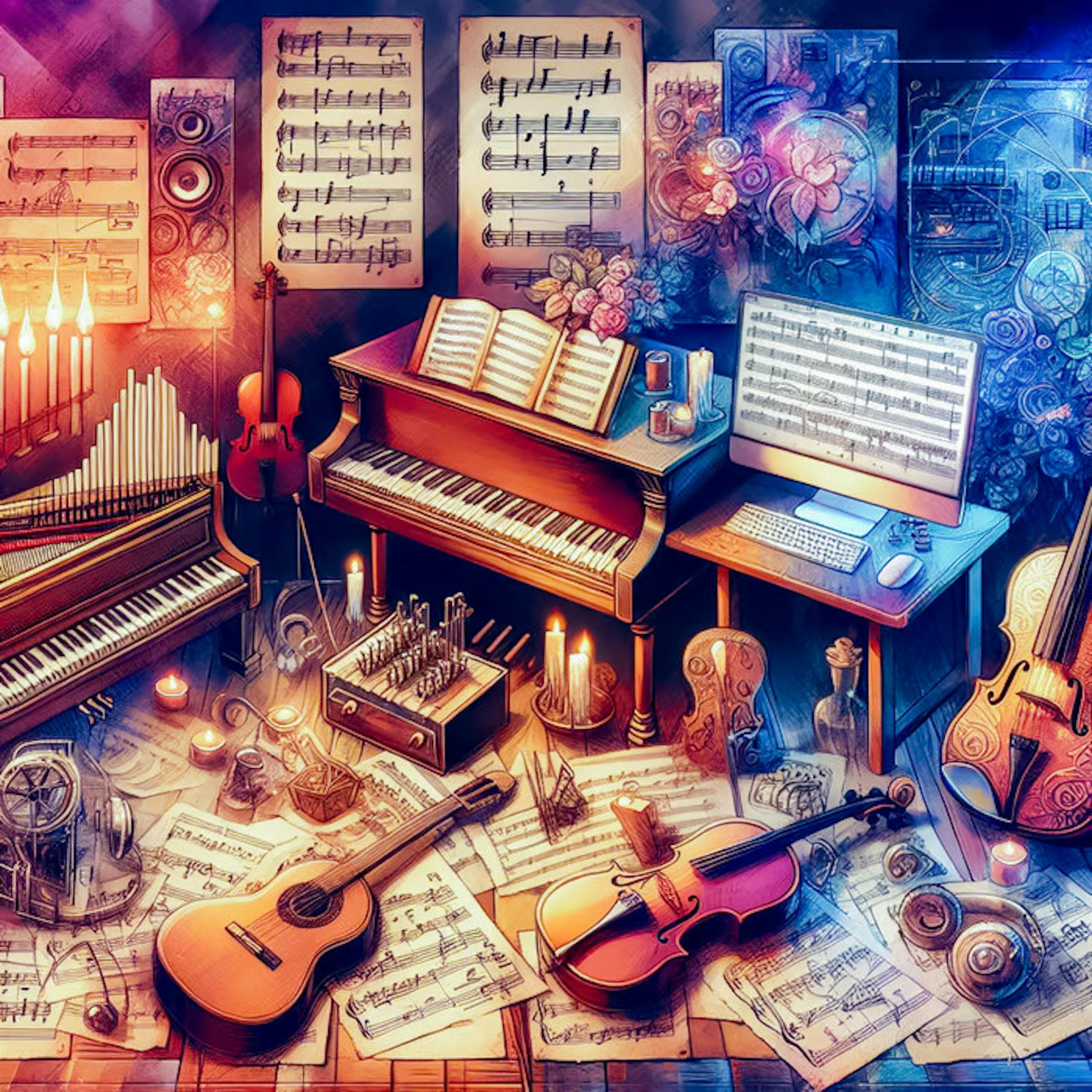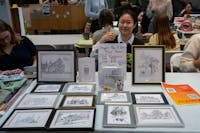The Hypercube concert: The future of music as composed by Brandeis
On Saturday, March 2, Hypercube performed musical pieces composed by current Brandeis students as a part of the Brand New Music concert series. Hypercube is a quartet that pushes the boundaries of chamber music, with a focus on performing cutting-edge new music. Last weekend, they performed never-before-heard pieces by Brandeis composers.
The concert began with music Ph.D. candidate Ying-Ting Lin’s composition “Press F to practice I”, described on the program as “stand[ing] at the precipice” of the artisan’s touch and AI’s prowess, acting as “a beacon in the fog of progress.” The piece was the only solo of the concert, played by Erin Rogers on saxophone. Rogers employed techniques that transformed this single-instrument performance into a one-woman band showcase. The performance began energetically, with a mysterious backing track accompanying the saxophone, producing a sound akin to a frustrated, barking puppy. The sound could best be described as “frightening” with the noises of the saxophone reminiscent of a squeaky violin, deep overtone singing and a dramatic horror movie soundtrack at various moments in the piece. There were brief moments of jazzy respite, with more traditional saxophone techniques and riffs, but the piece always returned to the avant-garde style it established. Rogers is clearly a very talented performer to be able to pull off this composition, but this piece, which is excellent in theory and important to the discussion of music’s future with AI, fell flat in terms of my expectations of the aesthetic experience music should produce. It challenged my idea of what music’s goal should be but left me with an unpleasant listening experience that made me unsure of the future of composition.
The next piece, “A Liminal Space in Memoriam Phill Niblock,” composed by graduate student Sam Long, was dedicated to “New York minimalist and champion of experimental artists” Phill Niblock. The program explains that the piece “explores his harmonic relationship of long sustained pitches, psychoacoustic phenomena, and sound’s relationship with architecture.” The piece included white noise in the background that at times blended with the instruments but sometimes overwhelmed them. The white noise reminded me of a dentist’s drill and made my head buzz in a confusing sensory experience. The percussionist, Chris Graham, circled a gong, instead of hitting it. The piano player, Andrea Lodge, hit the strings inside the piano with a ball attached to a stick. The guitarist Jay Sorce scraped some sort of tool against the strings. The saxophone blended in with the white noise, making it hard to differentiate between the noise and the sounds of the instruments themselves. There were some moments where the instruments were played as they were originally intended, with occasional moments of harmony, but the return to the abrasive white noise was always soon to follow. There was a period after the performance ended where the audience was allowed to sit and process what we heard, and silence took on a new meaning for me. The program definitely delivered on its description but it was generally an unsavory experience and I wouldn’t recommend it to anyone with dentophobia — a fear of the dentist.
“Love is the Water of Life” from Ph.D. candidate Ali Can Puskulcu, was inspired by a poem by Sufi poet and mystic Rumi. The composition “navigat[es] the intricate makamsal — Turkish microtonal music — pitch series” while inviting “contemplation and reflection.” Throughout the performance, the percussionist would whisper into a paper cone unintelligible phrases that I assume were the lines of the poem. There was a clear Turkish style established that lent itself beautifully to the performance. There were primarily higher notes in the first part of the performance, with riffs given to each instrument. A pleasant interlude of charming jumps happened between the saxophone and percussion with the guitar and accordion, played by Lodge, soon followed. A quick departure was sparked by the percussionist loudly banging on the drums and the saxophone having an argumentative-sounding solo. An explosion of sounds from all of the instruments followed. The percussionist then switched from drums to making cricket-like noises, then noises that sounded like stomping and slamming a door. A brief but impressive guitar solo happened before the cricket noises returned. The accordion was granted a solo that gradually grew in intensity and culminated in Lodge slamming the piano keys before another lengthy reading session from Graham accompanied by a shaker. This composition very impressively mixed the avant-garde elements of the other performances of the concert with more traditional-sounding elements. The reading was an interesting addition to an instrumental piece that I enjoyed hearing. However, I would have preferred clearer enunciation so the audience could hear the poem and understand how the composition accompanies it.
The next piece, “Cat(meowmeow),” by music masters student Brandon Qi had harmonic content “directly taken from [his] cat — named Piano — stepping over [his] piano.” The “Latin-inspired” piece switched out the electric guitar for an acoustic one and the alto saxophone for a soprano saxophone. This very pleasant, jazzy-sounding piece included contrasting melodies and an evident influence from Piano, the cat, on the piano. The traditional drum kit was a good addition to the ensemble. I hope “Cat(meowmeow),” and its balance between aesthetically pleasing sounds and more experimental, avant-garde sections, is indicative of where the future of composition is headed.
Undergraduate student Grace DeRoche ’24’s “Arcadia Nouveau” was the smoothest composition of the night. It is described as “a reflection on the idea of space, and what it means to inhabit” space, referring to natural, industrial and digital spaces that make up our lives. This piece works to instantly put its listener in a good mood with its gorgeous piano melodies accompanied by the xylophone as it explores the interaction between the “spaces that color our lives.” The guitar and piano were stand outs in this work, but all of the instruments worked together beautifully. The sole word I would use to describe the listening experience of “Arcadia Nouveau” is “lovely.” I didn’t experience the themes described in the program as clearly as with other performances, making the piece less conceptual. Nevertheless, it was a special and welcome break from the more jarring, experimental pieces.
The final performance of the night was Composition Ph.D. student Yu-Tung Cheng’s “Fish Study I: a thought swimming through and it’s mostly about food and sex.” The piece is inspired by Cheng’s “grumpy [seven]-month-old betta Roi” and “delves into the physical vibrational interactions among fish underwater, envisioning potential topics of their gossip.” The unique description, which included transliterated fish noises of “grrr ggr’ bulbbblgrr blupppp legrl” set my hopes pretty high. The performance started on an aquatic note with the percussionist making a pulsating sound by circling his finger around the rim of a glass of water before diving into a drum introduction. A backing track was played that felt disconnected to the instruments. There was a pause and a gentle return that was marked by the disjointedness of the noise. The minimalist piece included alternating from infrequent playing to explosions of sound but ultimately the composition felt empty and incoherent.
The experience of seeing how Brandeis students push the limits of composition made for a very thought-provoking evening. Whether or not I enjoyed each composition, they all gave me a lot to think about. Where is the future of music going? What are the goals of music? What is held sacred in composition and should it be sacred? What are the limits of an instrument? These questions are pivotal to my understanding of both modern music, modern art and literature as a whole, especially as it relates to artificial intelligence and the new digital age we’re in. I would highly recommend attending one of the upcoming performances of the Brandeis Concert Series and reflecting on the questions that it provides you with.




Please note All comments are eligible for publication in The Justice.